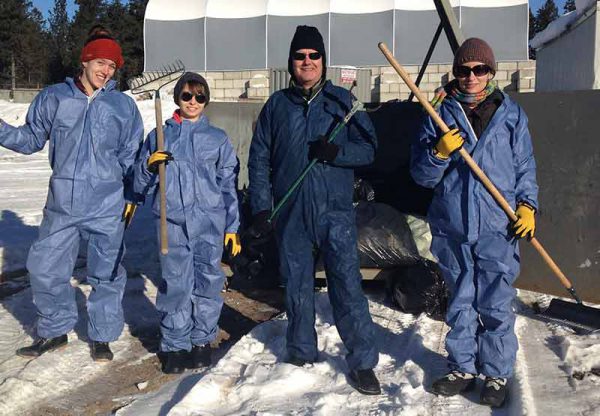Two Bachelor of Business Administration students – Jennifer Jenks and Natalie Panattoni – have written the following blog post about their experience doing research for their program’s Capstone project. Thanks ladies!
On February 2nd, a team of researchers got all dressed up. They weren’t going anywhere elegant, but the destination was certainly unusual. They were going to the SouthEast Disposal yard to sort piece by piece through a days’ worth of garbage from College of the Rockies.
It was a cold morning, so the seemingly smaller than expected pile of garbage bags was met with relief. The total weight of garbage to be sorted was 297 lbs, which took just over an hour for the team to go through. Certain types of waste were of particular interest to the team including paper towel, other paper, numbered plastics and organic (compostable) materials. These materials were weighed once sorted into their categories.
Most recyclable paper destined for landfill consisted of coffee cups. Coffee cups such as those from Tim Hortons, Starbucks, or the College cafeteria are recyclable once rinsed. Coffee lids (a numbered plastic) were also in excess. Numbered plastics were generally from food containers (coffee lids, yogurt cups, sandwich containers) that needed to be rinsed in order to be recycled.
A large amount of the other waste was materials assumed to be from the dental and nursing departments. These materials included thin, single use latex or plastic gloves, disposable bibs and face masks.
A total of 126.6 lbs, representing 42.6% of waste sent to landfill, was composed of recyclable or compostable materials. In addition, 22 refundable beverage containers were found during sorting. There was no clear glass and no tin cans found in the waste which suggests that the kitchen is doing an admirable job of sorting these items for recycling.
After shedding their coveralls, the researchers agreed on a few key findings from the waste audit:
- Rinse and Recycle. It’s not enough to just think, “Reduce, reuse, and recycle”. Critical to making recycling successful is to rinse out coffee cups and plastic containers so they don’t have to be thrown away and they don’t contaminate a recycle stream. Think Reduce, Reuse, Rinse and Recycle.
- A significant reduction in landfill waste would result from composting as well as rinsing and recycling. Organics accounted for 59.4 pounds (20%) of waste from a single day at the college.
- The lack of food grade glass and tin cans is impressive as well as encouraging.
